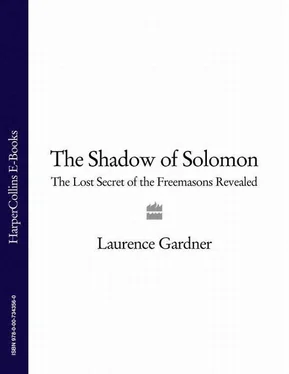BESTSELLING AUTHOR OF BLOODLINE OF THE HOLY GRAIL
THE SHADOW OF
SOLOMON
THE LOST SECRET OF THE FREEMASONS REVEALED

The mason poor that builds the lordly halls,
Dwells not in them; they are for high degree.
His cottage is compact in paper walls,
And not with brick or stone, as others be.
Edward de Vere, Earl of Oxford, 1573
Cover Page
Title Page LAURENCE GARDNER BESTSELLING AUTHOR OF BLOODLINE OF THE HOLY GRAIL
Epigraph The mason poor that builds the lordly halls, Dwells not in them; they are for high degree. His cottage is compact in paper walls, And not with brick or stone, as others be. Edward de Vere, Earl of Oxford, 1573
Introduction
PART I
1 Ancient Secrets
2 Masonic Origins
3 Royal Society
4 Legacy of Invention
5 Power and Politics
6 Imperial Conquest
PART II
7 Knights of the Temple
8 Hiramic Legend
9 The Transition
10 Rosslyn
11 Mysterious Science
12 The Temple of Light
13 The Lost Word
PART III
14 Anti-Masonry
15 The Tudor Stage
16 Guilds and Traditions
17 Into America
18 Debates and Monuments
19 The Royal Art
20 Discovering the Secret
NOTES AND REFERENCES
MASONIC AND MONARCHICAL TIMELINE
BIBLIOGRAPHY
INDEX
ACKNOWLEDGEMENTS
About the Author
Also by Laurence Gardner
Copyright
About the Publisher
For close to 300 years since the foundation of England’s premier Grand Lodge in 1717, many books have been published concerning Freemasonry. They appear with some regularity, and masonic libraries are extensive in Britain, America, France and other countries. These books reside in two clearly defined camps: they are either written by masons, or they are written by non-masons. In the latter case, there are further subdivisions in that the publications might be pro-masonry or anti-masonry but, either way, their contents are based on hearsay. In comparison, books written by masons are generally written for masons. Though perhaps authoritative, they are largely concerned with in-house doctrines, and often relate to specific aspects that are of little interest to outsiders.
In The Shadow of Solomon, I have approached the subject from an objective standpoint since I am able to call upon long-term experience as a Freemason, while also now being an equally long-term Past Mason. Initiated into a City of London lodge in 1966, and subsequently progressing through the Craft degrees, my active regular involvement as a Master Mason continued for around 20 years. By the middle 1980s, however, it became necessary to review my situation because the requirements of lodge membership were potentially limiting to my occupation as an independent researcher. Consequently, I tended my formal resignation at the United Grand Lodge of England.
Since that time, while taking neither a pro nor anti-Freemasonry stance, I have continued to investigate masonic history, structure and practice in the course of general studies which often have loose or close associations with masonry. These include matters that concern chivalric institutions, philosophical societies and other groups that have influenced monarchical and governmental structure over the centuries. In the course of this, I have met with both approval and disapproval from masonic quarters. As in any walk of life, it is not possible to please everybody all of the time—and Freemasons are no exception in this regard. The majority are tolerant, fair-minded individuals with an aptitude for discussion, but for some there is no debating ground beyond the recognized teachings. Hence, although Freemasonry is not a religion, it is similar in certain respects since its defence mechanisms can operate in much the same way if there is a perceived challenge to the accepted dogma.
Numerous Grand Lodges worldwide have websites on the Internet, and these often present an intriguing scenario. Their purpose is to be informative—and many are—but there is also a good deal of defensive content. Pages of official replies are given to what are taken to be harmful assaults against the masonic establishment. No other organization suffers from such a proliferation of accusations, nor feels the need to respond with guarded explanations in every case. But why, if the Fraternity is loyal and mutually supportive, should they even care what outsiders think? It is the masonic choice to be secretive—it is not forced on them.
It is often stated in official literature that Freemasonry is not a secret society, and this is true to a point because its existence is hardly a secret; neither is there any requirement for secrecy of membership. But, in reality, this is splitting hairs since the masonic charge is that members must ‘conceal and never reveal’ aspects of learning from within the lodge environment. Thus, although not a secret society, it is indeed a secretive society and, to outsiders, this amounts to the same thing.
The basic precepts of Freemasonry have much in their favour, but the most anomalous feature is that masonic practice derives from certain ancient sciences which are never actually taught. Ceremonies are performed and rituals are learned, but it is stated that, for all this pageantry, the secrets on which the Brotherhood was founded were lost long ago.
The most devastating loss of primary manuscripts in respect of ancient philosophical thought was caused by the Church of Rome’s burning of the Library of Alexandria in AD 391. Subsequent to this, numerous other records were destroyed throughout the Roman Empire. Some discoveries of the utmost significance were made in the Middle Ages when the Knights Templars excavated the Jerusalem Temple vaults after the First Crusade. But, again, much was destroyed in the 14th-century Inquisition against the Order. Remnants of documentation were preserved outside the Papal States, particularly in Scotland, and philosophers of the emergent Royal Society (such as Isaac Newton, Christopher Wren and Robert Boyle) used what was available to make some of the greatest ever scientific discoveries (or, as we shall learn, re-discoveries). Earlier in the 17th century, however, many valuable papers had been burnt during the Cromwellian Protectorate, with further losses incurred in the Great Fire of London. Following this, a change of reigning dynasty and parliamentary affiliation saw even more documentation sidelined, while many key adepts of the masonic tradition were dispersed into European exile.
Freemasonry, in its current form, was established in the 18th century as a questing fraternity that would endeavour to retrieve and collate what could be salvaged of the scattered archive, but it was a short-lived enterprise. Within a very short time the movement changed its emphasis to become a charity-based social institution, although electing to maintain aspects of ritual that would satisfy the original philosophical ideal. These days—although ostensibly perceived as a secret society—it is fair to say that modern Freemasonry’s best kept secret is that it actually holds no secrets of any genuine substance. Contained within the surviving Renaissance annals, however, are numerous pointers which, although perhaps vague and incomprehensible 300 years ago, are becoming thoroughly meaningful as modern science catches up with its ancient past.
In The Shadow of Solomon, we shall follow an investigative trail of documented record, accessing some of the archival material that the Masonic Constitutions claimed to have been lost more than three centuries ago. We shall consider modern lodge workings in comparison with those of the past, to ascertain how latter-day Freemasonry was shaped and manipulated so as to cause its own original precepts to be forgotten. The Shadow of Solomon is arranged in three parts: in Part I the focus is on power, politics and the conspiratorial intrigue that set the scene for masonic evolution; Part II deals more specifically with the ceremonies and alchemical heritage of Freemasonry—its connection to chivalric institutions and the philosophies that underpin the foundation; finally, in Part III, the puzzle condenses into a unified shape as we discover not only how the original secrets of the Craft were lost, but why this happened and—most importantly—what those secrets were.
Читать дальше













